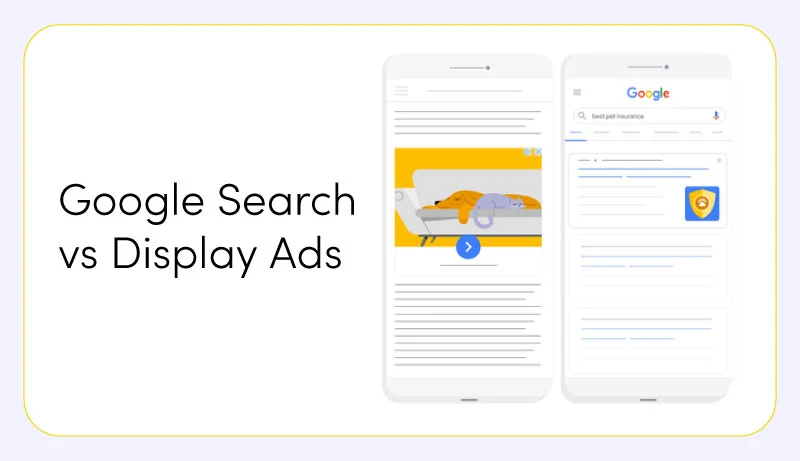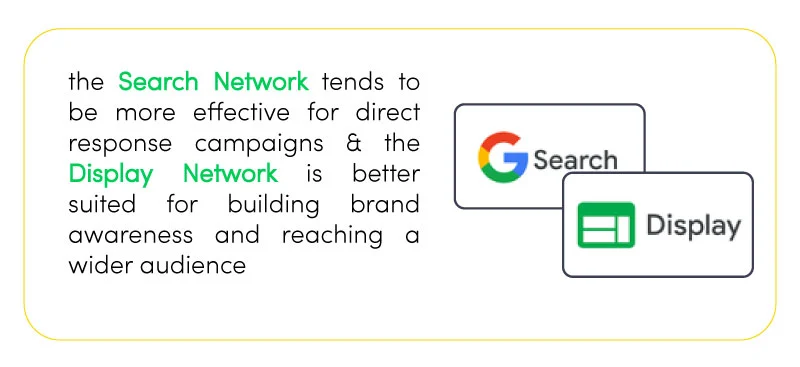In today’s fast-paced digital landscape, businesses have numerous options for advertising their products or services. Two of the most popular online advertising methods are Google Search Ads and Display Ads. As a business owner or marketer, it’s crucial to understand the differences between these two ad types and choose the right one for your specific needs and goals.

In this article, we’ll delve into the world of online advertising and explore the differences between these two types of Google Ads. We’ll compare their benefits and drawbacks, targeting options, ad formats, and performance metrics. We’ll also provide case studies and examples of successful campaigns to help you make an informed decision.
So if you’re a business owner or marketer looking to increase your online visibility and drive traffic to your website, keep reading. In this article, we’ll answer the age-old question of “Google Search vs Display Ads: Which one is better?”
Let’s start by defining what Google Search Ads and Display Ads actually are. Google Search Ads are text-based ads that appear at the top of the Google search results page when someone searches for a specific keyword or phrase. These ads are triggered by the user’s search query and are designed to be highly relevant to what the user is searching for.
On the other hand, Display Ads are visually appealing ads that appear on websites within the Google Display Network. These ads can be in the form of images, videos, or rich media, and they are targeted to specific audiences based on their interests, behaviors, and demographics.
Now, you might be wondering why it’s important to choose the right type of ad for your business. Well, the answer is simple – it can make or break your advertising campaign. Choosing the wrong type of ad can result in wasted resources, low conversion rates, and a low return on investment (ROI).
By choosing the right type of ad, you can effectively reach your target audience, increase your brand awareness, and drive more traffic to your website. We’ll help you understand the differences between Google Search and Display Ads, so you can make an informed decision and achieve the best possible results for your business.
So, whether you’re a small business owner or a seasoned marketer, understanding the intricacies of online advertising can be a game-changer.
Google Ads Search Network vs Display Network
When it comes to Google Ads, there are two main networks to choose from: the Search Network and the Display Network. The Search Network is a collection of search-related websites and apps where your ads can appear, such as Google search results, Google Maps, and Google Shopping. On the other hand, the Display Network is a vast network of websites and apps where your ads can appear, including popular sites like YouTube, Gmail, and millions of other websites.
One of the key differences between the Search Network and the Display Network is how people interact with them. The Search Network is based on a user’s search query, meaning that they are actively looking for something specific. In contrast, the Display Network is more passive, as people simply browse websites and apps, and your ad appears as they do so.
Another difference between the two networks is the type of targeting available. With the Search Network, you can target keywords that people are searching for, while the Display Network allows for more granular targeting, such as specific demographics, interests, and behaviors.

When it comes to benefits and drawbacks, the Search Network tends to be more effective for direct response campaigns, such as driving traffic to a website or generating leads. Meanwhile, the Display Network is better suited for building brand awareness and reaching a wider audience. Thousands of businesses take advantage of the Google Display Network and tools like Google Display Ads spy tools to spread the name of their brands across a massive network.
Of course, there are always exceptions, and the effectiveness of each network can vary depending on the specific business and advertising goals. In the end, it’s crucial to consider both networks and their respective benefits and drawbacks to determine which one is best for your business.
So, whether you’re looking to increase brand awareness or drive conversions, understanding the differences between the Google Ads Search Network and the Display Network is an essential step toward creating a successful online advertising campaign.
Difference Between Google Search and Display Ads
Now that we’ve explored the differences between the Google Ads Search Network and the Display Network, let’s dive deeper into the differences between Google Search Ads and Display Ads.
First, let’s look at targeting options. Google Search Ads are targeted based on the keywords that users enter into the search engine, while Display Ads offer a wide range of targeting options, including demographics, interests, and behaviors. This means that Display Ads can be highly targeted toward a specific audience, while Search Ads are primarily based on user intent.
Next, let’s examine ad formats. Google Search Ads are limited to text-based ads, while Display Ads can come in various formats, including image ads, video ads, and interactive ads. This means that Display Ads offer more creative freedom and can be more visually appealing than Search Ads. There’s a whole debate going on around which category Google Shopping Ads fit in, but the whole Search Ads vs Shopping Ads question isn’t really relevant right now and we’ll skip it.

Finally, let’s look at performance metrics. For Search Ads, the primary metrics to track are click-through rates (CTR) and conversion rates, as the goal is to drive traffic to a website and generate leads or sales. For Display Ads, the focus is more on building brand awareness and engagement, so metrics like impressions and engagement rates are more important.
It’s worth noting that both ad types can be effective for different business goals and industries. For example, Search Ads are great for businesses with a high-intent audience, such as those looking for a specific product or service. Display Ads, on the other hand, can be more effective for businesses with a longer sales cycle, such as those in the B2B industry.
Ultimately, it’s essential to consider the differences between Google Search and Display Ads, as well as your business goals and target audience, when deciding which ad type to use in your online advertising campaign. By understanding the unique strengths and weaknesses of each ad type, you can make an informed decision that will help you achieve the best possible results for your business.
Which is Better: Search or Display Ads?
Now comes the big question: which is better for your business, Google Search Ads or Display Ads? The answer is not a simple one, as both ad types can be effective depending on your specific goals and target audience.
First, consider your business goals. If your primary goal is to drive traffic to your website, generate leads, or increase sales, then Google Search Ads may be the best choice for you. Search Ads are highly intent-driven, meaning that people searching for specific keywords are more likely to convert into customers. On the other hand, if your goal is to build brand awareness and reach a wider audience, Display Ads may be the way to go. Display Ads can help you get in front of potential customers who may not be actively searching for your product or service, but are still within your target audience.
Next, think about your target audience. Are they highly intent-driven, or are they more likely to be influenced by brand messaging and visuals? If your target audience is more intent-driven, then Search Ads may be the better choice. However, if your audience is more visually-driven or influenced by brand messaging, then Display Ads may be more effective.

It’s also important to consider your budget and resources. While both ad types can be effective, they require different strategies and tactics to achieve success. Search Ads typically require ongoing optimization of keywords and ad copy, while Display Ads may require more creative assets and ongoing testing of ad formats and messaging.
Ultimately, the effectiveness of each ad type will depend on your specific business and advertising goals. To determine which ad type is best for your business, it’s important to test both and track your results. By analyzing your data, you can make informed decisions and optimize your campaigns for maximum effectiveness.
So, which is better for your business, Google Search Ads or Display Ads? The answer depends on your goals, target audience, and budget. With the right strategy and execution, both ad types can help you achieve your advertising goals and grow your business.
Conclusion
Choosing between Google Search vs Display Ads requires careful consideration of your business goals, target audience, and resources. While Search Ads may be best for driving traffic and generating leads, Display Ads can be effective for building brand awareness and reaching a wider audience. The key is to test both ad types and track your results to make informed decisions and optimize your campaigns for maximum effectiveness. By understanding the differences between Google Search vs Display Ads and selecting the right ad type for your specific needs, you can create successful online advertising campaigns that help you achieve your business goals.
FAQs
What is the difference between Google Search Ads and Display Ads?
Google Search Ads appear in search results, while Display Ads are banner or image ads that appear on websites within the Google Display Network.
Which ad type is better for generating leads and sales?
Google Search Ads are typically better for generating leads and sales due to their intent-driven nature.
Can Display Ads be effective for driving website traffic?
Yes, Display Ads can be effective for driving website traffic and building brand awareness.
How do I choose between Google Search Ads and Display Ads?
Consider your business goals, target audience, and budget to determine which ad type is best for your specific needs.







 Facebook Ads Spy Tool
Facebook Ads Spy Tool TikTok Ads Spy Tool
TikTok Ads Spy Tool